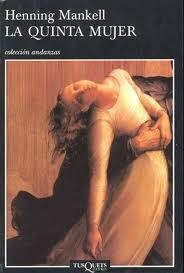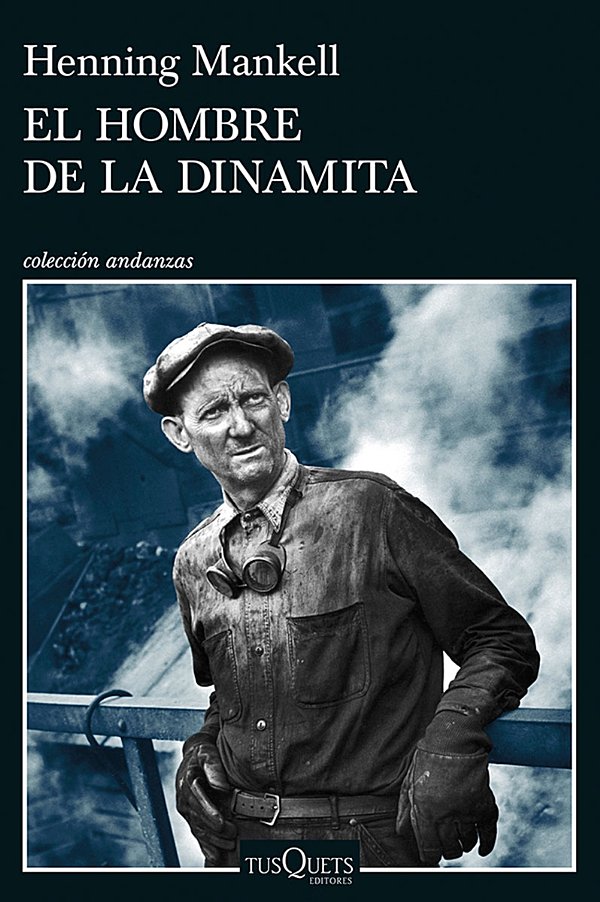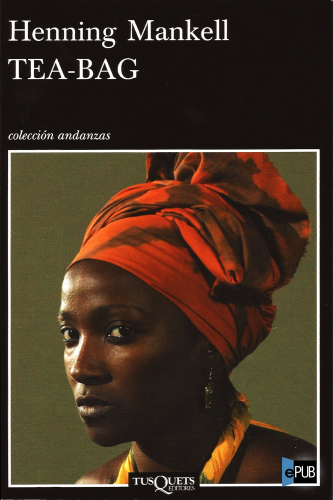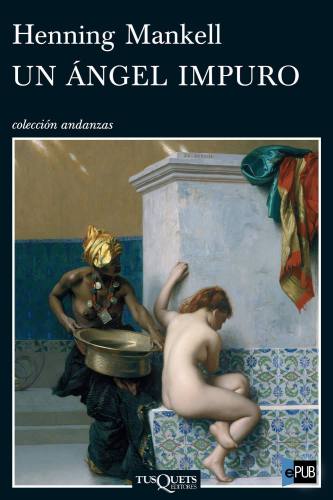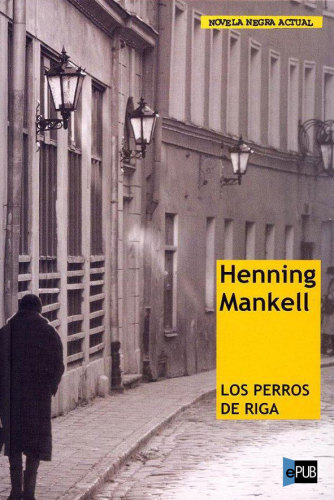oleebook.com
El cerebro de Kennedy de Mankell, Henning
de Mankell, Henning - GĂ©nero: Ficcion
Sinopsis
Mankell, Henning Year: 2009
Libros Recomendados - Relacionados
Reseñas Varias sobre este libro
I was so excited to read this book after I heard about it on NPR. Of course I was driving and must not have been paying that much attention, because my excitement was a tad unfounded.
This book is a REALLY GOOD IDEA, but in the end there were way too many loose ends, strange events, and characters that you thought were important but weren't really in the end. Go rent The Constant Gardener and you'll get a similar but more satisfying story.
I'm no expert in the Swedish tongue (nor the English, for that matter), but I'd venture a guess that the translator didn't have a firm grasp of Swedish, English, or both. There were some odd turns of phrase and a few words that I'm pretty sure ARE NOT WORDS. This would have been more distracting if the book had been more interesting.
A disappointment.11 s Lynda560 13
I agree with many of the comments shared by other readers. This is a vehicle for Mankell' s issues about AIDS, Africa and the mighty pharmaceuticals rather than a believable novel. I other readers am a fan
of the Wallander novels which I believe to be well written and plotted with a convincing cast of characters and a strongly realised protagonist in Inspector Kurt Wallender, however I have now read several of Mankell's other novels and have had similar feelings about them. Somehow his beliefs don't translate well into his story telling. Un the masterly John Le Carte Mankell appears to be unable to work with this material within the confines of a believable novel. This story appears clumsily translated but may just be laboured writing, is full of one dimensional characters who tend to appear and disappear with great rapidity, and has a main character who attempts to use her skills as an archeologist to solve the mystery of her son's death. The metaphor of her bringing together the shards of the mystery reconstructing a Grecian urn is endlessly laboured. I think I Will stick to Wallander from now on.fiction novels-in-translation9 s Elina502
???????? ?????? ???? ????? ??????...5 s Pete Acott16
If this was the first novel by a new author I doubt if it would have even attracted a publisher. The general story isn't a bad one, but unfortunately I just could not manage to get past two very ridiculous elements that occurred very early on. The first was how Louise managed to (correctly as it turned out) conclude that of all the places in the world her disappeared ex had buggered off to was Australia. The second point I couldn't get around was that virtually as soon as Louise got off the plane in Sydney she overheard a man speaking Swedish. She approached this man and within 24 hours he magically located Aron the ex. Sadly this was not the last of these howlingly unbelievable contrived coincidences. I could even have forgiven the ending if it had not been for things that, but overall even though the story is quite good it needed a more patient handling and perhaps that would have made it a much longer book. Perhaps for commercial reasons the book could only be allowed to be the length it is, but as I got to about 3 pages from the end with no apparent resolution in sight I thought it must be part 1 of a trilogy or something, but no. It ended clueless with a handwritten excuse from the author as to why he had not seen fit to provide a decent ending. 5 s Terri120
Drats. I really thought I was going to this book. It started off so well. Interesting plot, strong female character, Scandinavian setting...but alas it jumped all over the place. I was feeling jet lag from my reading chair. Let's see, Sweden, Greece, Portugal or was it Spain, Africa, back to Sweden, and again to Greece. How was she able to get a visa, I queried at one point. I did enjoy the woman's father. I could visualize that cold winter and the stark trees everytime she called him from whereever.mystery5 s Marissa Morrison1,803 22
Ugh - the feeling that comes from reading a terrible book by one of your favorite authors.
Henning spent a lot of time in Africa, and he wanted to highlight the plight of Africans with AIDS and to show how evil pharmaceutical companies can be. Apparently as an afterthought, he devised this plot.
Louise didn't know her adult son very well. She didn't know how his health was, how he made his money, who his (numerous and willing to share) girlfriends were. But she's pretty sure that he was murdered. So Louise traipses back and forth among three different continents to find out why he's dead.
At every point Louise is not as scared as she should be. A sensible person would call the police and hire a bodyguard when a) her co-investigator disappears, b) a person she's conversing with gets killed mid-sentence, and c) another person she's conversing with gets killed mid-sentence.
What's frustrating about this story is that none of the "good guys" is smart enough to take positive action. One of the son's girlfriends finds herself in dire circumstances with some damning intel about the bad guys. Does she use her cell phone to call Louise and spill the beans? No, she calls and asks Louise to hop on a plane from Sweden to Mozambique, then passes her a note in person to arrange a later meeting. Finally, she uses her last bit of strength to get to the meeting place but runs out of energy before delivering the full message. 4 s Simona110 27
Bine, fie, 2,5*. Mult prea ambigu?. A pornit de la o idee, a mers pe alta, nu a concluzionat nimic!3 s Stephen HayesAuthor 6 books129
Henning Mankell is perhaps best known for his detective stories set in the south of Sweden, featuring detective Karl Wallander. This is also a detective novel of sorts, but the protagonist is not a professional detective, but a middle-aged archaeologist, Louise Cantor, whose expertise has hitherto been confined to solving riddles of the distant past.
I found the story very reminiscent of The Constant Gardener by John le Carre, in that it deals with murders linked to multinational pharmaceutical companies, and the action moves from Greece, to Sweden, to Spain to Australia to Mocambique and back again. Australia is the only country visited only once.
Mankell does a very good job of building up a sense of mystery, followed by a sense of menace, in the early chapters, but unfortunately the story tends to fall apart towards the end, on the second visit to Mocambique, which is why I give it only three stars, instead of four or five. I won't go into details, because I don't want to give away the plot to anyone who hasn't read it, and I do think it is worth reading, but I did find the last few chapters a little disappointing.
crime-fiction our-books3 s Trish1,373 2,624
Most of us know Henning Mankell from his spectacularly successful series of murder mysteries featuring a grumpy and aging, but respected Swedish police inspector, Kurt Wallander. When I learned Henning Mankell spent half his time in Africa, and half at home in Sweden, I didn't know what to expect of his Africa novels. I knew his writing wasn't anything that of Alexander McCall Smith, whose charming mysteries are more ly to plumb the depths of a philosophical question rather than a gruesome murder. In Kennedy's Brain we are treated to a literary polemic reminiscent of John LeCarre's The Constant Gardener, which raged against the excesses and greed of capitalist pharmaceutical companies operating in Africa.
The story, of unregulated drug trials on healthy and sick Africans, ostensibly in search of a cure for AIDs, may suffer a bit in the telling but the rage of the author is fierce and very real. I sincerely wish the story hadn't a grain of truth, but I fear Mankell would not have sustained the telling of the story were it not so. Here is mystery indeed, and murder, though I prefer mine to be all fiction. Mankell deserves credit for looking long and hard at a very ugly story, and finding a way to tell us what we do not want to hear.africa mysteries scandinavian3 s Seija Grufstedt1 review2
This book takes the reader on a worldwide adventure between archeological digs in Greece, to the sculpture-laden, snow covered forests of northern Sweden, to the parrot covered coast of Australia and the city streets of Barcelona, where a mother is in search of finding out the truth behind her son's "suicide." Eventually, the journey culminates in Mozambique where terrible realities surface pertaining to the spread of AIDS and highly suspect treatment of it's African people.
This book brings to surface the question of how much we really know about the people closest to us. The descriptions of the atrocities committed on the citizens (and apes) are so horrifically detailed and so well written that it really makes you wonder how much of it is based in reality.
All in all, it was a great book. It did start out a little slow, but definitely got exciting from the middle on! I would definitely recommend it!3 s Ann1,351 10
To be fair, I may have misjudged this book because it was an ARC that had numerous errors (more than I've ever noticed in an ARC). My guess is that by the time it came out in print, some of the translation had also been smoothed out.
The story is interesting enough, involving a grieving archeologist mother; a mysterious,dead son; a number of possibly good/possibly evil characters who are involved in the AIDS crisis in Africa; a subplot of what happened to JFK's brain when he was killed, and how might human brains be studied in order to decode the future. So plenty of plot complications.
The book was just similar enough to John Le Carre's THE CONSTANT GARDENER that it kept falling short. The characters were not as deeply drawn, the writing (at least, as translated), as lyrical and full of power.
But, hey--Mankell is a world-famous author from Sweden,and perhaps I just did not get him at his best (because of the particular book, the translation, or the poorly-prepared ARC).2 s Jacob32
Very enjoyable Mankell. He's still got it. Engaging story and fascinating travels accross the globe (Sweden, Australia, Spain, Africa). A puzzle is put together slowly of how a character was trying to reveal the truth. Disapearences, mysterious deaths, and chilling depictions of power wielding individuals in poverty and AIDS stricken Africa all add up to a compelling read. I was a little let down by the ending but may just need to think about it more.2 s Inga1,387 57
Kennedys Hirn – huh, was für ein Titel! Man erwartet historische Brisanz, Polit-Thriller, sensationelle Enthüllungen. Man erwartet sicher nicht Wut über das Elend der Welt, besonders der dritten Welt, und man erwartet auch nicht, am Ende weiterhin ohne Antwort auf die Frage dazustehen, was mit Kennedys Hirn nun eigentlich passiert ist.
Die Handlung: Die schwedische Archäologin Louise Cantor findet ihren Sohn tot in dessen Wohnung auf. Sie glaubt nicht an Selbstmord und beginnt auf der Basis der Aufzeichnungen ihres Sohnes Nachforschungen anzustellen, die sie nach Australien, Spanien und Afrika führen. Überall findet sie neue, teils schockierende Spuren ihres Sohnes, dessen Leben offenbar ein anderes war, als sie vorher geahnt hat.
Nachdem mein letzter Mankell, nämlich der Roman „Die italienischen Schuhe“, mich begeistert hat, stehe ich „Kennedys Hirn“ eher ratlos gegenüber. Erwartungen werden geschürt, nicht erfüllt. Charaktere eingeführt, aber nicht weiter aufgebaut, sie bleiben flach, so vielversprechend sie erst auch waren. Mankell versucht zudem aus der Perspektive einer Frau (und Mutter) zu schreiben, etwas, was er zuvor kaum getan hat. Das war vielleicht auch besser so. Ihre Emotionen werden zu dick aufgetragen, wirken letzten Endes überzogen bis unwirklich. Und diese Fragen, jede Menge Fragen, die sich der reflektierende Leser dann wohl selbst beantworten soll. Nur das mir dazu nach 397 Seiten irgendwie die Energie fehlt.
Jedes dunkle Geheimnis kann mit passenden LĂĽgen und Intrigen vor den Augen der Welt versteckt werden. Oder gerade doch nicht?
Aids frisst Afrika. Die Aids-Forschung frisst Afrika. Doch was fange ich nun damit an?
Ratlosigkeit ĂĽber die Aussage des Buchs. Frustration ĂĽber die fehlenden Antworten.
Da hätte ich vielleicht doch lieber noch einmal „Die italienischen Schuhe“ oder einen alten Wallander-Krimi gelesen.
Henning Mankell: Kennedys Hirn. dtv, MĂĽnchen 2008.2 s Colleen Clark196 7
This is a dark story about the early days of the AIDS epidemic, set in Mozambique. The main character, Louise, is a Swedish archaeologist who works in Greece. She goes home to Sweden to give an academic paper and to visit her only child, Henrik, a young man in his 20's, only to find him dead in his bed. The cause of death is uncertain. Louise, the mother, is convinced he must have been murdered, but eventually the police say the cause of death is an overdose of barbiturates. Louise is frantic, incredulous.
The story unfolds in a complex way - back and forth to Sweden to visit her father, Artur, who lives up north. Her mother was dead. She searches for Henrik's father, Aron, who left her many years ago. She finds him in Australia. She thinks about her life in Greece. She and Aron search Aron's computer files and find a completely unexpected connection of Henrik to Barcelona. They fly off to Spain together.
Henrik had a girlfriend in Sweden who provides some clues. Louise and Aron learn more in Barcelona. Aron disappears completely. Louise flies off to Mozambique to follow the trail.
Another woman. The story is very tense and Louise is personally frantic in a search for Henrik's life. Characters appear and disappear. Nothing is certain. Everything is frightening. Kennedy's brain? A clue from Henrik's computer files - an interest in John F. Kennedy's brain. What??? Why???
It's a gripping tale. The underlying theme of AIDS in the early days, the connection to Africa. Fear.
As I read, I kept thinking of the Ebola epidemic now wreaking havoc in W. Africa and spreading fear far and wide in the US, and probably Europe too. The Dark Continent. Disease, death, corruption, untrustworthy characters.
I'm just discovering Mankell. A masterful spinner of tales and a keen observer of character and place.
fiction2 s Grada (BoekenTrol)2,012 3
A very good book indeed.
Not just because it is written by Mankell, not at all. Id this book a lot, because it made the despair, the anger, the grief of the characters playing a role in this book almost tangible.
I feel hardly any connection at all with the African continent. Never been there, do not wish to go there. In that I'm almost the opposite of the author of this book, who keeps Africa close to his heart.
How he's able to make me forget that it is Africa he's talking about, how he makes his book universal about the fight against those who take advantage of HIV-infections / AIDS, how he shows that people all over the world can be bad, greedy, good, false, afraid and above all, lonely.... I'm really stunned.
This all points in the direction of 5 stars, if not.... if there were not the end of this story. the author says, it is his choice to make the book end here. And for me, it was too short. The story of Louise has not come to a conclusion for me and I hate to live with this open ending. Almost makes me feel at the end of a movie.... cliffhanger -> there will be a sequel. I hope the author will stick to this one book. Not that I'm not curious about what's happening to Louise, but I would have wanted to read that in this book and not get that continuation in a new book.bookcrossing books-i-own crime-thrillers-espionage ...more1 L1,423 30
Someone needs to get the key containing the period for poor Mankell's computer. Perhaps the pathetic use of punctuation in this book is intentional, stylistic. It makes it hard to read the text & is driving me crazy!
There was a story here, albeit a strange one, an international, paranoid, murder mystery. It's a story of a mother's love and loss, of a mother learning that there was much she didn't know of her son & his life, much she didn't know of herself and her feelings for her son's father. There is also cold and heat, figurative and literal (Sweden to Africa for the latter). Mankell gives us well-drawn, interesting (if not necessarily likable) characters.
So why only three stars? That's about the ending. SPOILER WARNING!! There really isn't a clear ending, which obviously is intentional. The resolution of what Henrik had uncovered is seriously horrible, involving on-going mass murder. How Henrik got involved, what drove him to pursue what he found, is never clarified. The epilogue speaks of Mankell's anger, which drove the book. Does that mean we should take the mass murder as real? As a stretch of the real? What does he mean? I don't know.
mystery2 s Clotilde93 36
J ai beaucoup aimé ce livre, il a certes quelques défauts de longueur dans le récit. Mais j ai aimé le style le personnage de louise.
Louise découvre son fils mort, commence alors une enquête et une quête pour elle. Entre les retrouvailles avec son ex mari et les découvertes sur la vie de son fils. Et sa confrontation avec un monde qui lui semble inconnu. Qui était il vraiment? A t il découvert quelque chose ou une part sombre de lui l' a amené à se suicider. Louise voit elle le mal partout , où se cache t il vraiment une machination effroyable derrière des gens qui prétendent faire le bien.
Le titre du livre est très bien choisi, on comprend que ce n'est pas dans l histoire le lien avec Kennedy mais plutôt le sens de cacher la vérité dans les deux cas.
Quotes:
Un être humain peut être réduit à néant et se relever de ses ruines une fois avait elle pensé ,mais deux c est trop2 s Mr. Gottshalk694 17
I am very surprised that the overall average for this book is just over 3 stars. I really enjoyed this novel by Mankell, written in 2004, and thought it had everything: a mother's quest to find out who her son really was, the complicated relationships and tangled webs the characters weave, the nonstop search for the truth, and an interesting journey to three continents to boot. I know Mankell spent a lot of time in Mozambique and this is the second time he has taken me there in his novels. The grotesque undertone of what was going on literally "under the surface" of Africa seemed plausible and kept me hooked. I woke up early to finish this one and it is a story that will stick with me for a while - no spoilers here!2 s Gerry Durisin1,949 1 follower
Now that Mankell will write no more books, I've been making my way slowly through his backlist. Kennedy's Brain, published in 2005, spans a variety of settings: Greece, where Louise Cantor is working as an archaeologist; Sweden, Louise's native land, where her father still lives and where she returns home to visit her son; Australia, where her former husband and the father of her son lives a reclusive life; Spain, where her son Henrik had a flat and a life of which she was completely unaware; and most of all, Mozambique, where Henrik sought to help AIDS victims and stumbled upon a mystery that forms the core thread of this novel, along with somber reflections on human greed and cruelty.abc-challenge-2020 around-the-world hoopla-ebook ...more2 s Guillermo Jiménez466 317
Novela brutal. Se le podrá criticar un poco el aire panfletario que acompaña la narración, sin embargo, es para esto que también funciona la literatura. Se deja traslucir el coraje y la impotencia de un filoafricano como lo es el sueco (casado con la hija de Bergman) Mankell, para denunciar los abusos del poder ¿mundial? en contra de una de las zonas más desprotegidas del planeta. Más que entretenimiento este libro contiene escenas de sumo terror. El terror que puede causar solo el hombre y los niveles de vileza que puede alcanzar.2 s Barbara473 6
While Mankell is a good writer and I remained absorbed through most of this book, in the end, he left way too many questions unanswered. It was he reached a certain page number and decided, OK, that's it, I'm done. It was obvious that his outrage over the AIDS epidemic in Africa was much more important here than the plot.
2 s Christa Sigman511
300/0327 pages in and I still was not sure why I should care or if I even wanted to know the outcome. This was by far the most boring, non-engsging mystery I ha Ave ever read. If you want to journey with a mother in her guilt trip without any real reason to find out why the dead is dead read this. If you want a gripping, can't put it down book don't read this one read-in-20182 s Kevin21
It was ok, I learn from any book and when I read I to imagine myself in the locales. This book, although I thought was very well written, tended to go all over the place and was a diatribe against the AIDS epidemic.2 s Chani49 2
Not much happens, it's long-winded and there are recurring narrative devices that get annoying in the long run. Methinks Mankell struggles with writing women and is losing its way.1 Tommy7 11
Horrible drivel connected by huge plot holes.
It's Mankell had something to say but had no idea how to get it out.2 s The Katie223 4
This had a lot of potential. Even to the end. But I felt the story dropped off, questions left unasked, unconcerned.to-read-from-the-bookshelf2 s Tina Marga121
This is a story about the author's anger, but one may wonder what the anger is exactly about. Is it about the impact of AIDS, the scrupulous experiments on humans by pharmaceutical profit seekers, or the absence of any rules or regulations against these practices in a country Mozambique? As in his other books, the author draws beautifully parallels between character features of the main character, Louise, and what is happening in the nature surrounding this person. He lets Louise travel from Greece to Sweden, to Spain, to Australia and to Mozambique. Each time we learn something about these countries, which I also find wonderful. It is to the best of my knowledge, the only book in which Mankell writes from the viewpoint of a woman. And what Louise finds is gloomy. As gloomy as the disappearance of US President Kennedy's brains.1 Oktober119
Sehr schwach. Hölzerne Dialoge, unsympathische Figuren, die unglaubwürdige Entwicklungen durchmachen bzw nicht glaubwürdig angelegt sind. Das Schwächste, was ich bislang von Mankell gelesen habe.1 Ian ChadwickAuthor 5 books5
I loved every one of his Wallander books, but this is darker, and less focused. I couldnÂ’t find any relatable or even sympathetic characters. It doesnÂ’t feel as believable as his Wallander books in them or the settings.popular-fiction1 Iris7
Autor del comentario:
=================================
